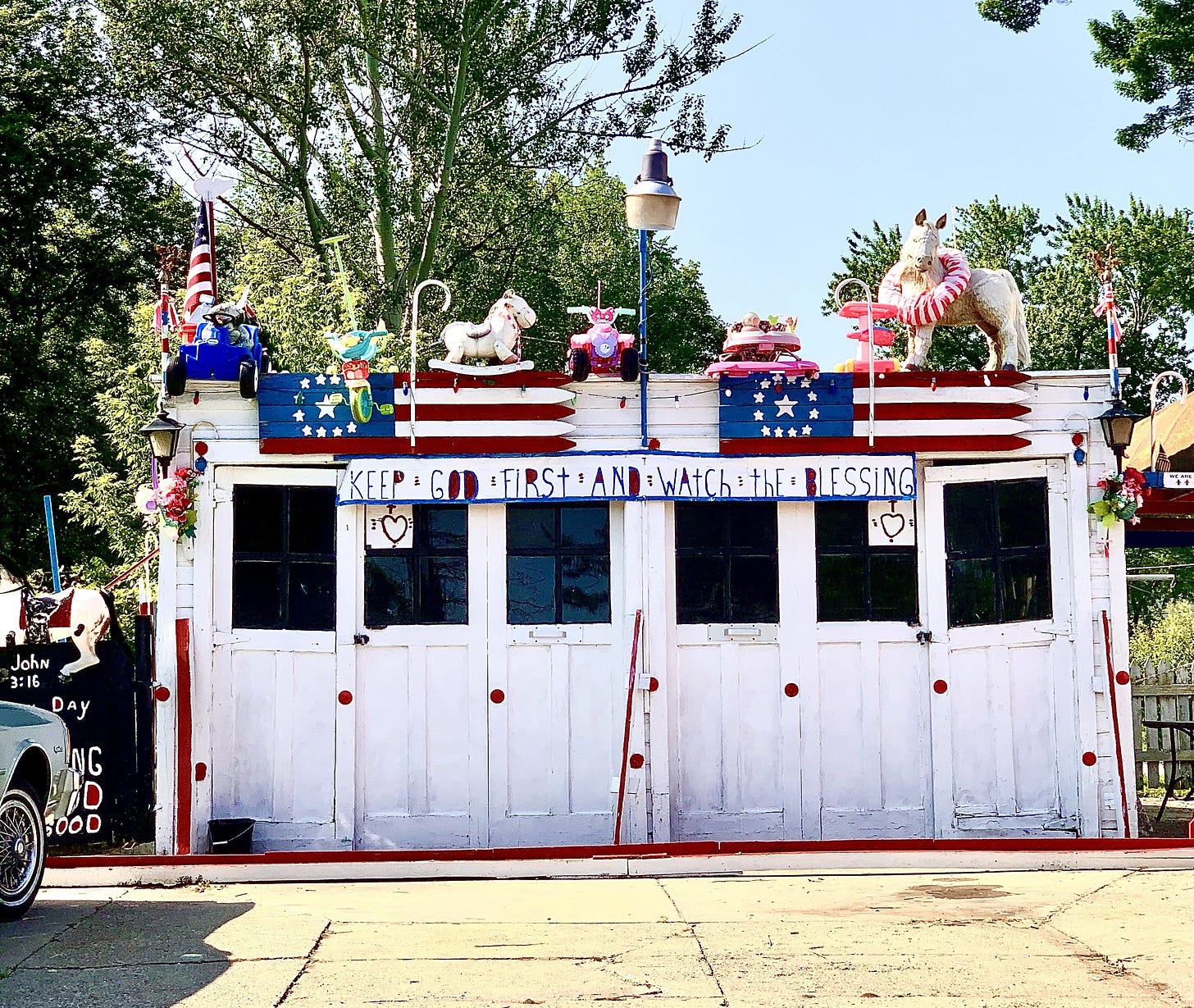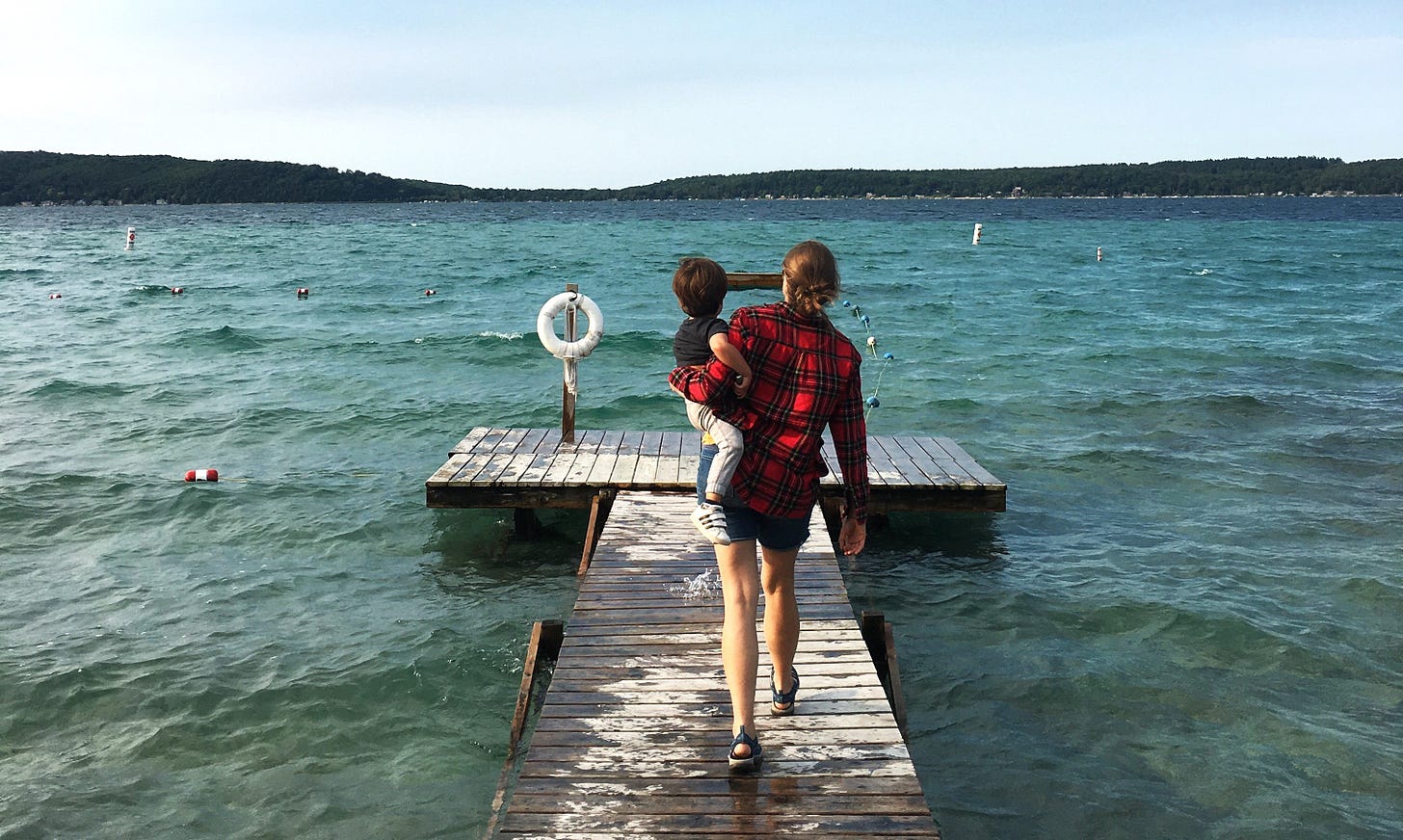Disappearing Neighborhoods
However your community is torn from you, when it happens, you will grieve
Since the 1960’s Flint, Michigan has lost over half it’s population. A chain reaction triggered by GM outsourcing and automation led to the city becoming famous for all the wrong things: violent crime, blight, addiction. Out-migration was inevitable, and it has only accelerated in the past decade in response to Flint’s other claim to fame, the water crisis, where the state of Michigan knowingly poisoned it’s own residents. Who could blame anyone for leaving? Now a city whose population peaked at almost 200,000 has less than 80,000. It’s dropping every day.
The area I live, which is also the area I where I grew up, faces the opposite problem. The whole region has been transitioning from an agricultural economy with light industry to a tourist economy for my entire lifetime. The transition is almost complete. During the pandemic suddenly huge swaths of upper class and upper middle class people were working from home and realized they would like to at least live somewhere beautiful, at least part of the time. Who could blame them? With our shorelines, rivers, and forests, Northwest Michigan is one of the most breathtaking places in America. In many parts of the region, especially the towns along Lake Michigan, home prices have literally tripled since 2019. Benzie County, where I live, was famously one of the three poorest counties in the state when I was a kid. Now it’s the eighth wealthiest, and I promise you it’s not because the poor people left. Residents who grew up thinking of themselves as small town, rural people find themselves living in towns that are a little less small, a region that’s a little less rural.
A month or so ago I was talking with an old man from Flint. He had lived in the same house for fifty years, and he told me with pride about how his used to be a middle class neighborhood full of families whose whose sole bread earners worked on the line at Chevy in the Hole. They made good wages with good benefits and took pride in being home owners. Their kids played together outside daily. You already know what happened next. Today, he says, there is one other house left standing on his block. And it’s abandoned. It took half a century, but the way he talked about these changes made it sound like they had happened over night. He felt like they had.
This summer I was talking with a woman in early retirement who lived in Frankfort, Michigan. Middle class but not wealthy (think retired teacher). She lives in the same house she grew up in, inherited it when her folks died. A handful of blocks from the beach and a few blocks from the main drag. Frankfort, for anyone not familiar, is vacationer destination numero uno in the area. A beautiful beach and all the requisite breweries, fudge shops, and stores where you can buy a stuffed moose holding a sign that says “Up North”. Maybe a couple Petoskey stones.
This woman talked about how, back when she was growing up, all those big, beautiful houses in her neighborhood held big families with lots of children. She would play outside with dozens of neighbor kids every day after school. Back then the houses were a little worse for the wear, what with all the slamming doors and roughhousing, but people sat on their front porches, neighbors visited. I’m sure it wasn’t Eden, but she made it sound pretty damn nice. She named the families on the block wistfully. Some of them are still in the area, but not on her block. Those big houses have all been renovated. They look beautiful. And every single one on her block besides hers is an Air BnB now.
When I moved to the North End neighborhood of Detroit in 2010, I was always moved by the care that the hold outs took in their gardens, their porches, their front yards. A house sandwiched between two boarded up, burnt out hunks of blight would be in pristine condition, looking like something out of a Norman Rockwell painting where a kindly grandma would pour you a glass of iced tea as you sat in a rocking chair. I was always touched by the defiant hope this showed. “I ain’t going anywhere”. This is a phenomenon that still exists in cities across the rust belt. But now I feel the same way about regular middle and working class peoples homes that are surrounded by the McMansion cottages, condos, and rental properties of the leisure class, whether it be in rural or urban Michigan. You can tell which houses are lived in and which have the sterility of a vacation property. I love seeing an overturned bike in a front yard, a mini fridge on a porch.
People in a place like Flint, or any number of small farm communities across our state, are in shock. They see their neighborhood, their community, disappearing in front of their eyes. Falling off the face of the earth. It feels like losing a part of themselves, like an amputation. Those of us that live in and/or grew up in the booming areas, the vacation areas, witness the flip side of the problem and it inspires the same feelings in us. A profound sense of loss, of confusion. Grief.
The truth is you don’t have to drive the 3 hours from Frankfort to Flint to see it. There are towns fifteen minutes from Frankfort that will be ghost towns within my lifetime. They’re well on their way now (take a spin through downtown Thompsonville next time you’re in the area). And there are places fifteen minutes from Flint that are booming, rapidly changing, forcing people out (looking at you, Grand Blanc). But the fact that ordinary working and middle class people on both sides of the problem feel the same thing in their guts is a sign that if we want, we can build real relationships across these divides. And that matters for organizers like myself who are trying to build coalitions with enough power to fix the shit. Enough power to win.
The job of an organizer, one job, is to seize on a persons anger, pain, frustration, grief, and facilitate their transformation of it into power. To say “You’ve been watching this happen in your neighborhood for how long? Don’t you think we could DO something about it?” One tool in the organizers belt is the simple act of introducing people to each other. When we meet someone who is, on the surface, very different from us but who is struggling in a similar way with similar issues, it has the potential to light a fire. If there are countless others like me out there, maybe we could do something about it. Strength in numbers. And then there is the natural connection to make. What’s happening in Flint and what’s happening in Frankfort are caused by the same meta-issue. The disappearance of the middle class. The ever-accelerating division of our society into haves and have nots. The increasing difficulty that ordinary people face in maintaining a stable life, in a stable neighborhood, let alone owning a home.
Over the past few years in my work we’ve begun to bringing blue-collar black folks from places like Flint together with blue collar white folks from rural Michigan. Sometimes I feel organizers overthink stuff like this: “we have to be very prepared. What if someone says something messed up? What if it’s awkward?”. But regular people are tougher than we give them credit for, and able to get along better with people seemingly unlike themselves that we think. They don’t need hand holding. I’ve been pleasantly surprised every time how quickly people hit it off. It shouldn’t be a surprise though. We have so much in common. The important things. And it becomes obvious real quick when we sit down together over some pizza or coffee. We need to be less cautious about inviting people in to rooms together. It’s the first step towards winning. If we’re too scared to take the first step, what are we doing?
I have a memory from childhood that’s hazy enough it might have been a dream. The town I grew up in has a population of 300. It sits on the shore of a large inland lake. That lake is increasingly surrounded by Mcmansions, which sit empty 10 or 11 months a year. In the downtown there’s a giant pine tree, and when I was a little kid, I remember at Christmas they would light the tree. Seemingly the whole town would walk down, hold hands and sing Christmas carols. I remember sitting on my dads shoulders, walking home past the grocery store, bundled up, seeing other kids bundled up too, either running around or being carried by their parents. I remember neighbors greeting each other and laughing. It’s all hazy and vague. Maybe it never happened.
That tree is still there though. Next to it is a dentist’s office that’s been closed for a decade, a for sale sign out front. The grocery store is abandoned. Hugh closed up his barber shop across the street a couple years back. I don’t know whether they still light the tree or not. Around the lake you can hear the power saws all summer as new Mcmansions go up.
A pastor I know up here once said to me: “Here’s my question: is this going to be a community, or just a place where a bunch of people exist?” A good question. A good question for a lot of us, regardless of where we live.
Quick note: After my introductory post a handful of you opted in to a paid subscription. I’m grateful, but that’s not something I expected. There may be a time in the future that I begin offering additional content for paid subscribers, but I have no plans to do so now. This is all free, and I’m not planning on it being a source of income for me. I’m going to email those of you who did so and offer to refund you, but if you do want to do a paid subscription, I will put all the money back in to my organizing work, through a donation to my organization, Michigan Faith in Action.





